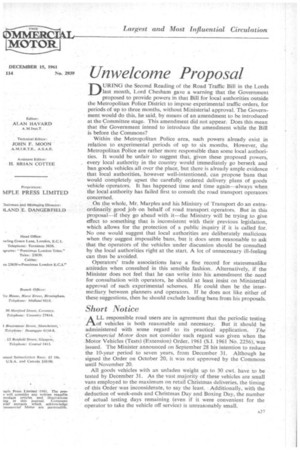Unwelcome Proposal
Page 29

If you've noticed an error in this article please click here to report it so we can fix it.
DURING the Second Reading of the Road Traffic Bill in the Lords last month, Lord Chesham gave a warning that the Government proposed to provide powers in that Bill for local authorities outside the Metropolitan Police District to impose experimental traffic orders, for periods of up to three months, without Ministerial approval. The Government would do this, he said, by means of an amendment to be introduced at the Committee stage. This amendment did not appear. Does this mean that the Government intend to introduce the amendment while the Bill is before the Commons?
Within the Metropolitan Police area, such powers already exist in relation to experimental periods of up to six months. However, the Metropolitan Police are rather more responsible than some local authorities. It would be unfair to suggest that, given these proposed powers, every local authority in the country would immediately go berserk and ban goods vehicles all over the place, but there is already ample evidence that local authorities, however well-intentioned, can propose bans that would completely upset the carefully ordered delivery plans of goods vehicle operators. It has happened time and time again—always when the local authority has failed first to consult the road transport operators concerned.
On the whole, Mr. Marples and his Ministry of Transport do an extraordinarily good job on behalf of road transport operators. But in this proposal—if they go ahead with it—the Ministry will be trying to give effect to something that is inconsistent with their previous legislation, which allows for the protection of a public inquiry if it is called for. No one would suggest that local authorities are deliberately malicious when they suggest impossible bans, but it does seem reasonable to ask that the operators of the vehicles under discussion should be consulted by the local authorities right at the start. A lot of unnecessary ill-feeling can thus be avoided.
Operators' trade associations have a fine record for statesmanlike attitudes when consulted in this sensible fashion. Alternatively, if the Minister does not feel that he can write into his amendment the need for consultation with operators, he should at least insist on Ministerial approval of such experimental schemes. He could then be the intermediary between planners and operators. If he does not like either of these suggestions, then he should exclude loading bans from his proposals.
Short Notice
• A LL responsible road users are in agreement that the periodic testing • .n..of vehicles is both reasonable and necessary. But it should be administered with some regard to its practical application. The 'Commercial Motor does not consider such regard was given when the Motor Vehicles (Tests) (Extension) Order, 1961 (S.I. 1961 No. 2256), was issued. The Minister announced on September 28 his intention to reduce the 10-year period to seven years, from December 31. Although he signed the Order on October 20, it was not approved by the Commons until November 20.
All goods vehicles with an unladen weight up to 30 cwt. have to be tested by December 31. As the vast majority of these vehicles are small vans employed to the maximum on retail Christmas deliveries, the timing of this Order was inconsiderate, to say the least. Additionally, with the deduction of week-ends and Christmas Day and Boxing Day, the number of actual testing days remaining (even if it were convenient for the operator to take the vehicle off service) is unreasonably small.




















































































































